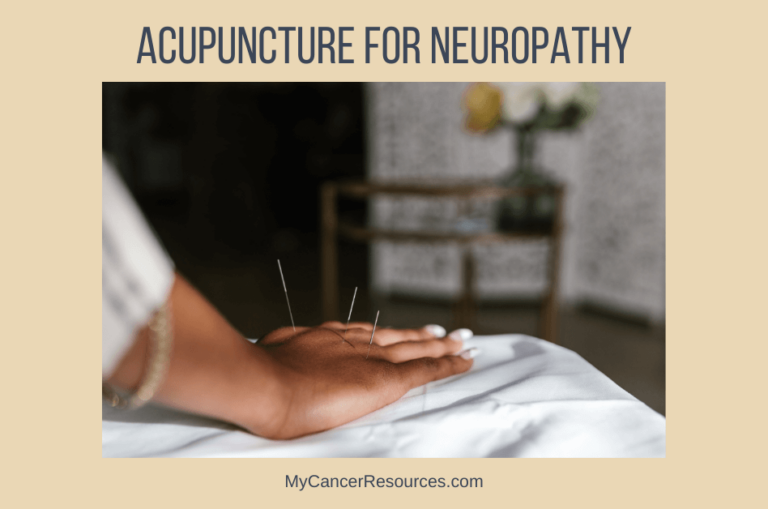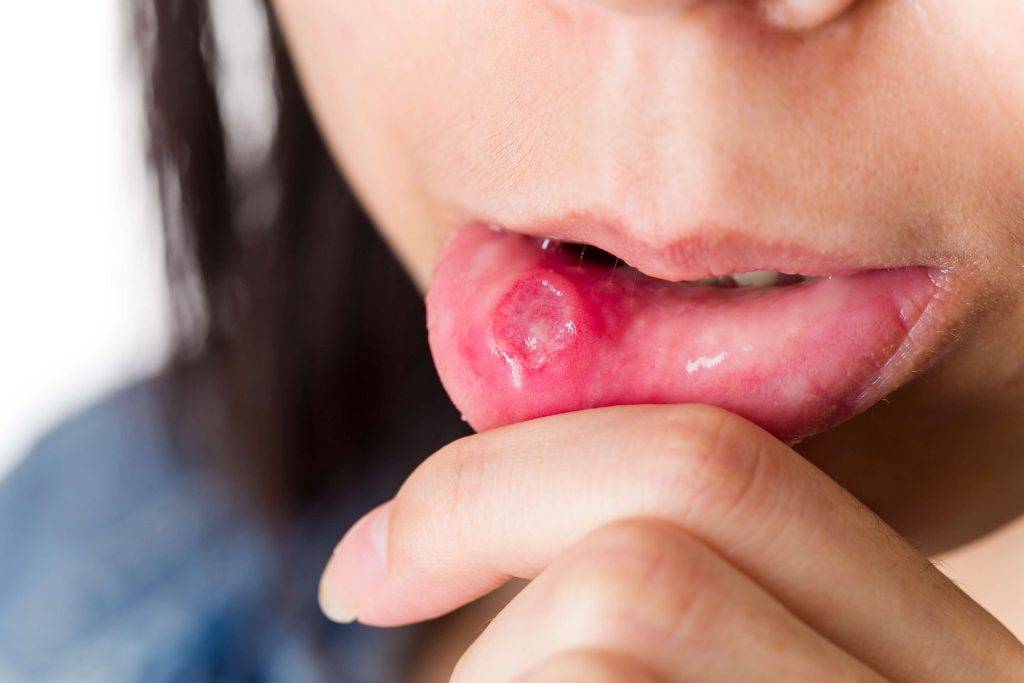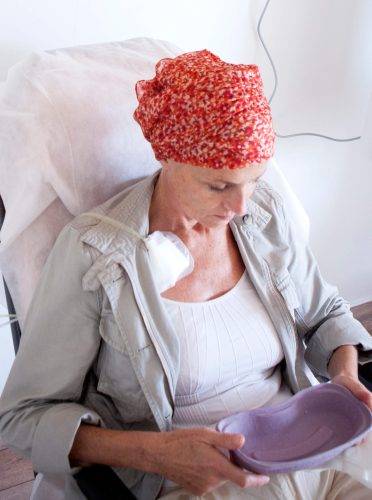
Neuropathy (nerve damage) can be very distressing to people with cancer. It can be a mild annoyance all the way up to pain that doesn’t let you move much and can really impact your quality of life. One way to try and relieve the pain and discomfort is through acupuncture. Acupuncture for neuropathy is becoming more mainstream, as more and more people, not just those with cancer pain, are finding positive results through this alternative treatment.
This article goes into detail about what neuropathy is, how it develops, what acupuncture is and how it can treat neuropathy, along with what to expect in an acupuncture session.
What is Neuropathy?
Neuropathy is when there is damage or dysfunction of one or more nerves in the body. Peripheral neuropathy is damage to nerves outside of the brain and spinal cord (the peripheral nervous system). There are different types of neuropathy, but this article will focus on the peripheral neuropathy that people with cancer tend to experience.
The signs of peripheral neuropathy include tingling, numbness, muscle weakness, and pain in the affected area(s) – often the hands and feet. Symptoms of peripheral neuropathy can develop gradually or suddenly, and may vary in intensity.
The pain is often described as stabbing, burning or throbbing. Walking on hard or cold surfaces can be very painful, with many describing it as walking on rocks or broken glass.
This type of pain can be tough to manage as it doesn’t often respond to traditional pain treatments. Many turn to alternative treatment options like acupuncture for relief without side effects from traditional medical treatment like opioids.
How Does Neuropathy Develop in People with Cancer?
There are five main ways that someone with cancer can develop neuropathy:
- The tumor itself might press on nerves, or grow into the nerve tissues, causing damage
- Surgery to remove a tumor may cut into and damage sensory nerves
- Radiation can also damage nerves in the area that’s being treated
- The medications used to treat cancer can damage nerve function. This is called Chemotherapy-Induced Peripheral Neuropathy (CIPN).
Certain chemo drugs, like in the platinum and taxane drug families (like Carboplatin or Taxol) are more likely to damage peripheral nerves than others.
CIPN can resolve after chemotherapy stops, or it can remain a problem long after treatment has ended, which can greatly impact one’s quality of life. - A condition called paraneoplastic syndrome is where the body’s immune system attacks nerve cells, mistaking them for cancerous cells. This can cause even more neurological symptoms, including changes in sensation and motor function.
What is Acupuncture?
Acupuncture is a form of treatment in Traditional Chinese Medicine (TCM) that involves inserting very thin needles into specific points on the body.
TCM is based on the belief that a life force or energy, known as Qi (pronounced “chee”) flows through the body along pathways like rivers. These pathways are called meridians. When Qi becomes blocked or unbalanced, it stops that flow of energy, which can lead to pain or illness. Acupuncture is used to unblock these meridians and restore the flow of Qi, which then leads to pain relief.
Western medicine would say the use of acupuncture stimulates nerves, connective tissue and muscles. In turn, the body releases endorphins, which are the body’s natural painkillers. This can lead to significant improvement in symptoms really quickly for some patients.
Acupuncture can also promote healthy blood flow and nerve regeneration, or regrowth.
In addition to treating neuropathy pain related to cancer, acupuncture has been shown to be helpful in the treatment of diabetic neuropathy, rheumatoid arthritis, bell’s palsy and carpal tunnel syndrome.
Types of Acupuncture Techniques
Don’t be put off by the thought of having a bunch of needles stuck into your skin. As someone who isn’t the biggest fan of needles, I can attest that my acupuncture treatment (not for neuropathy) was not painful and was surprisingly relaxing. Many others I’ve worked with who use acupuncture for the symptoms of neuropathy and other chronic conditions say the same thing.
Thin (smaller than a sewing needle) acupuncture needles are inserted into specific points on the body. Often, they’re inserted about a half an inch into the skin, but it may be deeper, depending on the area being treated.
Acupuncture needles may be directly in the area feeling the pain, like the feet, but may also be in other areas where the Qi may be blocked. So if you have neuropathy in the feet, you may have needles placed in the top or bottom of your foot, but also on the inside of the knee and near the ankle. There are even places on the ear that correspond to different parts of the body, so needles on those points may be used to help relieve your pain.
Electroacupuncture passes a mild electric current through the needles. This is thought to intensify the nerve stimulation, and relieve pain better and faster.
Not all acupuncturists use electroacupuncture, so talk to them and see if this type of acupuncture would be appropriate for your situation and if so, if that is an option for you at their practice.
Choosing the Right Acupuncturist
Your oncology treatment team may recommend an acupuncturist. Some treatment centers already have a complementary medicine department and can offer these services all in the same place.
If you have to find someone yourself, it’s important to find a licensed acupuncturist with lots of training in Traditional Chinese Medicine. Not all states require licensing, but you want to make sure you’re working with someone with experience in treating neuropathic pain.
A couple of resources to find acupuncturists in your area are the American Association of Acupuncture and Oriental Medicine and the Acupuncture Now Foundation. Read reviews and testimonials from other patients online, and set up a consultation to see if you feel comfortable working with them.
Ask about their approach to treating neuropathy. A good practitioner will discuss their treatment plan and how they have helped others with CIPN or other cancer-related neuropathy. Ask what a typical treatment course includes, like the number of sessions they suggest, the areas where needles will be placed, and what outcomes you might expect.
Also consider the location and availability of the acupuncturist. You may need to have regular sessions, so accessibility can be an important factor in your decision.
What to Expect in an Acupuncture Session
You’ll wear loose, comfortable clothes to your session that can be easily moved around, depending on where the needles will go.
Depending on the area being treated, you’ll recline or lay on a treatment table.
After a quick review of your signs of neuropathy and other medical conditions, the acupuncturist will open the packaging of sterile needles and begin to place the fine needles into the specific points to address your nerve pain. In some instances, the needle may be wiggled or rotated to get a specific result.
The sensation can vary. Some feel a tiny prick as needles go in, others describe a tingling or numbness. The hands and feet might feel different as these areas can be more sensitive, but a good acupuncturist makes sure you have minimal discomfort.
In my experience, only rarely did I get a ‘zing’ from a needle when it touched a nerve, but that sensation immediately went away and I didn’t feel a thing. It wasn’t too unpleasant and I knew the acupuncture was doing what it was supposed to do.
The needles will stay in place for around 15 to 30 minutes. There may be soft music playing and you may be encouraged to take deep breaths and practice other relaxation techniques. Like I mentioned before, I would fall asleep during some of my sessions, I was so relaxed.
Once the session ends, the needles are removed, and you can go about your day. You should immediately feel more relaxed and as you progress through sessions, hopefully your pain will be reduced. Some notice a significant difference right away, and others need treatments over several months to find relief.
You may start off seeing your acupuncturist a few times a week and gradually reduce sessions as your peripheral neuropathy symptoms improve. So it may move to once a week, then every other week, then once a month until you no longer have symptoms.
Acupuncture is often an effective treatment. It isn’t a guaranteed cure for nerve damage and pain, but it may reduce symptoms to a level where they don’t interrupt your life – like only having occasional tingling in your fingers or sensitivity to cold. Something that may be tolerated and to where you don’t feel like you need to continue treatment.
What are the Risks of Getting Acupuncture to Treat Neuropathy?
Acupuncture is generally safe when performed by an experienced, well-trained practitioner using sterile needles. Improper needle placement can cause pain during treatment. There’s also a risk of needles breaking, though this is rare.
To minimize risks, you should always visit a certified acupuncturist. Confirm that they use single-use, disposable needles to avoid the risk of infection. Make sure the practitioner follows proper safety protocols, similar to those of any medical facility.
If you have a bleeding disorder or take blood thinners, talk to your doctor before undergoing treatment since there’s an increased risk of bruising or bleeding.
Electroacupuncture may cause problems with pacemakers or other implanted electrical devices. Pregnant women should also consult with their health care provider before having acupuncture.
Always provide your acupuncturist with a full medical history, as certain health conditions might affect the approach to your treatment.
Additional Ways to Soothe Neuropathy Symptoms
In addition to using acupuncture to treat nerve pain, here are some additional ways you may find relief. Lifestyle changes may be easy to incorporate into a plan that includes acupuncture, including:
- Engage in regular exercise: Physical activity improves circulation and can reduce the pain of neuropathy.
- Eat a healthy diet: Nutrient-rich foods support nerve health and may reduce symptoms.
- Use topical treatments: Capsaicin cream or lidocaine patches can offer temporary pain relief for affected areas.
- Consider supplements: Certain vitamins and supplements, like B-complex, alpha lipoic acid, and magnesium, may support nerve health.
- Explore physical therapy: A physical therapist can design a program to keep muscles strong and improve mobility.
- Explore occupational therapy: An occupational therapist can design a program that can allow you to continue to take care of yourself, like grasping things, buttoning and unbuttoning clothes, etc that can be harder to do while dealing with nerve pain.
- Practice stress-reduction techniques: Meditation, deep breathing, and yoga can help manage the stress that often makes pain worse.
- Ask your doctor about medications: Over-the-counter pain relievers or prescription meds may be appropriate for some patients.
- Investigate other complementary therapies: Therapies like massage, biofeedback, or herbal remedies might offer additional relief.
- Use assistive devices: Braces or orthotic shoes can reduce discomfort and improve movement.
Final Thoughts
Acupuncture is an ancient alternative medicine practice that is rooted in Traditional Chinese Medicine. It has a unique approach to nerve pain treatment. By targeting specific acupuncture points, it aims to restore balance and promote natural healing within your body.
Acupuncture can be a useful therapy to include in your chronic pain management plan.
Acupuncture can be an effective treatment for neuropathy, and may lead to significant improvements in your daily life. Results may vary, but since there are minimal risks, it may be worth exploring this as an opportunity to provide natural pain relief.
Your turn: What’s your experience with acupuncture for neuropathy? Is it something you’re considering, or have you tried it and found relief? Share your thoughts in the comments below.
Medical disclaimer: The content on My Cancer Resources is provided for informational and educational purposes only, and is not intended as medical advice, or as a substitute for the medical advice, diagnosis or treatment by a physician or other health care practitioner.



